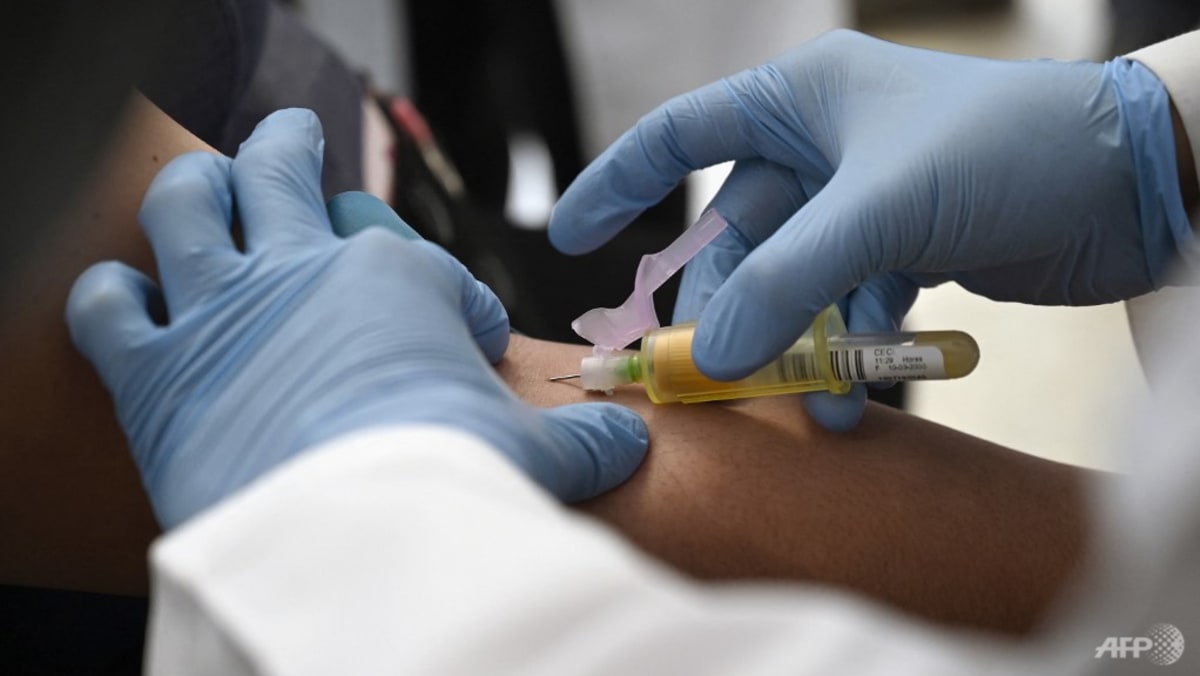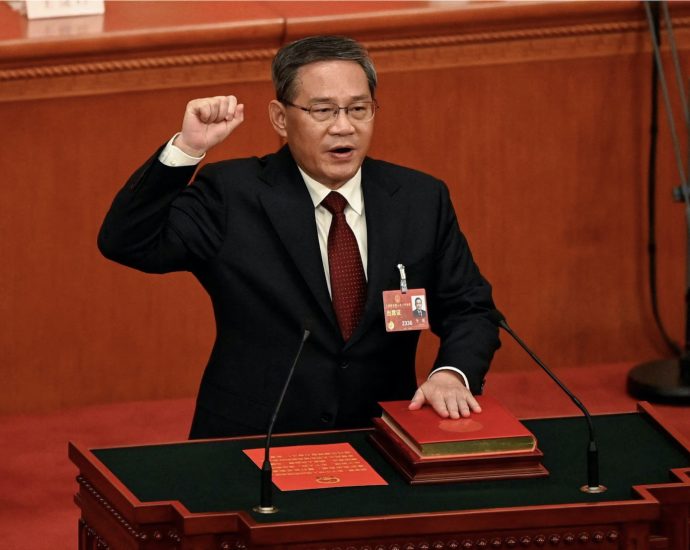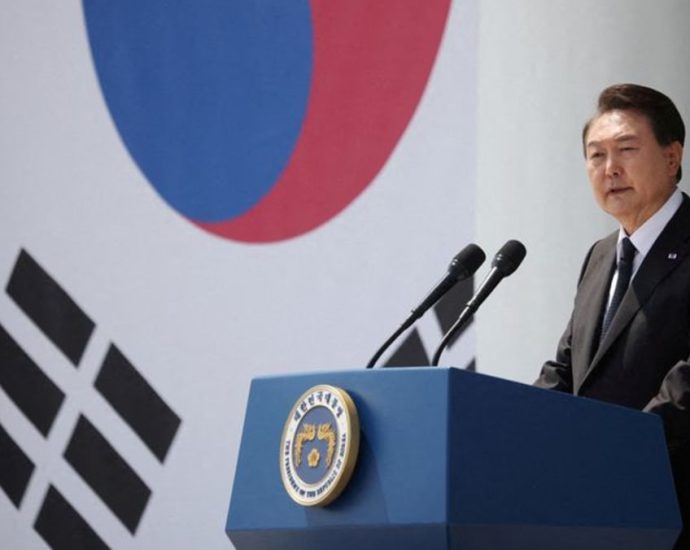For big business, a puzzle: How to cut carbon while keeping profits
Claire Perry O’Neill was fresh-faced from the gym as she dialled in from her Singapore hotel room.
It was early in the morning in the high-fuelled atmosphere of Ecosperity Week, a three-day conference hosted in the Lion City from 6-8 June inviting business leaders, policy-makers and investors to track the path to Asia’s transition to a “net zero” carbon output.
On the tail end of record-breaking heat waves across Southeast Asia, such an event could leave room for cynicism. But Perry O’Neill, former U.K. energy minister and current managing director for climate and energy at the World Business Council for Sustainable Development, a global organisation of 200 businesses, sees plenty of reason for hope.

“I’m very optimistic,” she said. “The climate numbers are difficult. We’re dealing with record heat levels, which is a wake up call. But we’re up for the challenge. And I find that very, very energising.”
A long-time booster for energy transition policy, Perry O’Neil served as a minister in the Conservative-led government from 2017-2019. In that role, she made some milestones while pushing forward the U.K.’s ground-breaking net zero legislation and successful bid to host the UN Climate Change Conference (COP26) in 2021.
But now, following an abrupt split from the government at the start of the year – claiming the ruling Conservative party was dominated by “ideology and self-obsession” – Perry O’Neill is back to business.
Amidst the heat of a rising climate crisis paired with growing public scrutiny of corporate ‘greenwashing’, the private sector will likely need to do more to substantiate claims of environmental friendliness. Now, both with the council and as an advisor to Terrascope, a Singapore-based decarbonisation platform, Perry O’Neill aims to provide better tools to accurately monitor emissions along value chains. The goal is to help companies meet evolving reporting requirements while pushing investment to be more effectively climate-conscious.
“The slight tragedy of it is that the global climate community thinks businesses are the bad guys. There is a view that growth is bad business,” she observed. “[It’s] so much better to have public-private cooperation and really unleash business and have it do what is good.”
We still had a view that this was all highly negative and costly. And it is costly. But there was no conversation about the opportunity and the growth.”
Claire Perry O’Neill
Business is Perry O’Neill’s background, as her political career was preceded by 20 years in consulting and finance.
It wasn’t until a professional pause that the Oxford University geography graduate considered the increasingly ominous climate crisis as a core part of her career.
“It was the first spike in climate interest,” she recalled, describing the mid-2000s. “It was when Al Gore’s movie came out, there was that feeling of quick climate chaos.”
A policy role led to her becoming a member of parliament in the then-opposition Conservative party, and eventually a part of former Prime Minister Theresa May’s cabinet.
“It was just after the Paris Agreement of 2016-17, so we had this kind of shared narrative,” she said. “But we still had a view that this was all highly negative and costly. And it is costly. But there was no conversation about the opportunity and the growth and the fact that if we are going to do this, there are ways to do it fair and equitable – and also profitable.”
Now, more than half a decade later, Perry O’Neill is attempting to tackle these conversations from the other side of the public-private divide.
One example she points to is the buildings that make up tightly-packed cityscapes that make up regional metropolitan areas such as Singapore, Kuala Lumpur and Jakarta. Buildings account for around 40% of finite energy consumption in Southeast Asia. But as Perry points out, “we pass policies all the time that say we have to have more energy efficient buildings. [But] it’s really difficult to do on the ground.”
Transitioning 80% of Singapore’s buildings to ‘green buildings’ meeting certain environmental standards such as reduction in energy, water and material resource usage, is a key part of the government Building Construction Authority’s Green Building Masterplan.
But according to a report by energy management system company Schneider Electric and the Singapore Green Building Council (SGBC), 60% of 500 Singapore-based firms surveyed weren’t familiar with the concept of green buildings, and only 12% indicated that all their operations used them.
“There is a sense of urgency that needs to happen, because these are really long tail decisions.”
Claire Perry O’Neill
A key challenge contributing to this disconnect is lack of transparency and data. During an Ecosperity panel, Lauren Sorkin, executive director of the Resilient Cities Network, estimated that investors could miss out on $7 trillion in benefits from nature-based climate solutions, such as planting mangroves in coastal areas, before the end of the decade due to lack of data.
It is this kind of data that Perry O’Neill believes is critical for the private sector to integrate energy transition as a realistic, attainable part of business continuity.
“If you can’t measure it, you can’t manage it,” she said. “What you need to do is have your CFO, your procurement head, make decisions every day that reduce your overall value chain emissions.”
Increased scrutiny of businesses’ carbon emissions can help tackle the opaqueness that facilitates corporate greenwashing. On the flip side, it also forces governments and businesses to consider the potential impact of a dramatic energy shift, especially for a region that remains heavily reliant on fossil fuels.
Against that entrenched reliance on carbon-based energy, there is no shortage of ambitious promises in the region.
Indonesia – a country that exported a record 448.5 million tonnes of coal in 2022 and generates more than 60% of its energy from the carbon fuel – has recently claimed it can reach net zero emissions by 2055, ahead of its target.

Some private-sector actors seem to be on board to ditch coal. At an Ecosperity session, Singaporean bank DBS – Southeast Asia’s largest lender by assets and a member of the Sustainable Business Council – announced plans to take funding for new coal plants out of its lending matrix.
But to turn statements into action, there needs to be investment and new technologies that require collaboration between states and businesses, across industries and borders.
Such coordination will inevitably take time to come together. Perry O’Neill is clear in her view that “everyone needs to get off coal” but showed some wariness of the pace of change.
“There is a sense of urgency that needs to happen, because these are really long tail decisions,” she said.
China, despite its pledge to be carbon neutral by 2060, has approved more coal power projects in the first three months of 2023 than all of 2021, a move Perry O’Neil noted will doubtless influence Southeast Asia.
At an Ecosperity fireside chat, Singapore Minister for Development Desmond Lee noted the need to be “realists with a quiet sense of optimism”. Perry O’Neill liked this combination.
“I’m not for chaos,” she asserted. “I’m for order and transparency. But I’m also fed up being told why we can’t do things. I think that is a very dangerous mindset.
Ruangkrai files challenge to Pita’s eligibility for office
Not related to media shareholding row, says petitioner

Political activist Ruangkrai Leekitwattana on Tuesday submitted additional documents to the Election Commission affirming his contention Move Forward Party leader Pita Limjaroenrat’s ownership of media shares meant he was ineligible when he registered to run for election.
His move came after the EC on June 9 threw out all complaints related to media share ownership against the MFP leader and prime ministerial candidate, but will instead investigate whether Mr Pita applied to be a list-MP candidate despite knowing he might not have been eligible.
EC chairman Ittiporn Boonpracong on Monday said that, with information available, a committee would be set up to further investigate whether Mr Pita violated Section 42 (3) and Section 151 of the law on the election of MPs.
Under Section 151, those who apply to run in an election while knowing they are not qualified or prohibited from doing so are liable to a prison term of one to 20 years and a fine of 20,000-200,000 baht. They are also banned from running in an election for 20 years.
Under the current constitution, individuals with media holdings are barred from running for political office.
Mr Ruangkrai said he had submitted more documents to the EC, affirming that Mr Pita had violated Section 151,
They included Mr Pita’s Facebook post to clarify his iTV shareholding and a report on Mr Pita’s transfer of his iTV shares to relatives on May 25.
Also submitted to the EC were the minutes of the online meeting of iTV shareholders on April 26 which contained a question from a shareholder about iTV’s business and the answer from a company executive that iTV was a media outlet, and video of the same meeting which showed him giving a contradictory reply.
Mr Ruangkrai said the minutes of the meeting and the video had nothing to do with his earlier petition about Mr Pita’s media shareholding.
He also submitted to the EC documents on iTV’s plans to continue operating a media business after its contract with the Prime Minister’s Office was terminated. He said the company’s financial statement for the first quarter of 2023 stated that it ran a media business from February 2023 and revenue from the business would be known in the second quarter.
Mr Ruangkrai said he was not worried about opponents’ claims he used false documents in filing the petition against Mr Pita.
He said once the EC endorses Mr Pita’s election, he would again submit a petition seeking Mr Pita’s removal under Section 82 of the constitution.
Section 82 states that at least 50 members of the House of Representatives, or 25 members of the Senate, can submit a petition seeking a Constitutional Court ruling on whether an MP held a seat in violation of the constitution.

Ruangkrai Leekitwattana
New HIV infections among Singapore residents fall to lowest level since 1998

RECOMMENDATIONS BY NATIONAL HIV PROGRAMME
Separately, a team of doctors from the National HIV Programme has recently developed a set of recommendations for more people to voluntarily get tested and catch infections earlier.
These recommendations were published last month in a review article in the Singapore Medical Journal.
The National HIV Programme is run by the respective clinical HIV programmes under the National Centre for Infectious Diseases, National University Hospital, Singapore General Hospital and Changi General Hospital.
The doctors recommended that all those aged above 21 – except females above 65 – should be offered HIV screening at least once in their lifetime, unless they have risk factors that warrant repeated screening.
Those who engage in high-risk behaviour, such as those with a history of injection drug use or those with multiple sex partners, should also be screened for HIV at least once a year, they said.
For high-risk individuals who are being tested for the first time, or do not have sufficient education on the implications of an HIV test, the doctors said pre-test counselling is strongly encouraged.
HIV testing is traditionally performed at hospitals, clinics and through services provided by community-based organisations. Several, including local non-profit organisation Action for AIDS, offer anonymous testing.
The doctors also recommended that healthcare and HIV testing service providers encourage individuals to disclose their HIV status to their spouse, current sex partners and previous sex partners. They should also be encouraged to get tested.
Positive HIV results should be told confidentially and in person by physicians or other skilled staff due to the risk of discrimination and stigma, the doctors added.
In their article, they pointed to the “95-95-95” targets set by the Joint United Nations Programme on HIV/AIDS in a bid to end the epidemic.
These targets are getting 95 per cent of all people living with HIV to be aware of their diagnosis by 2030; 95 per cent of those diagnosed to receive sustained antiretroviral therapy; and 95 per cent of those receiving antiretroviral therapy to achieve viral suppression.
The doctors noted that estimates based on data from 2020 indicate that 82 per cent of people in Singapore who have HIV infection know their status; 93 per cent of those who are aware of their status are on antiretroviral therapy; and 94 per cent of those on therapy have sustained viral suppression.
“Hence, more can be done to increase the uptake of voluntary HIV testing with a view to reduce the number of late‐stage infections at diagnosis,” they wrote.
“Early detection of infection allows earlier initiation of antiretroviral therapy, which reduces the risk of developing serious AIDS‐related events, serious non‐AIDS deaths or deaths by at least 50 per cent.”
HIV attacks the body’s immune system, specifically its white blood cells. There is no cure but with treatment, an HIV-positive individual can maintain an undetectable viral load.
This means there is effectively zero risk of transmitting HIV to their sexual partner, even if they do not use condoms during penetrative sex.
HIV-positive individuals who do not get treated can develop AIDS (acquired immunodeficiency syndrome), which is potentially fatal. This typically takes anywhere between five to 10 years.
Other than unprotected sex, a person can contract HIV by sharing injection equipment, contaminated blood transfusions and organ or tissue transplants. It can also be passed from a mother to her unborn child.
Those who want to learn more about HIV and AIDS, and find out where to get HIV testing, can go to go.gov.sg/preventhiv.
Chinaâs surprise rate cut may be just the beginning
Tuesday’s surprise People’s Bank of China (PBOC) interest rate cut signaled the depths of Beijing’s concerns about the slowdown in Asia’s biggest economy.
Governor Yi Gang’s team lowered its seven-day reverse repurchase rate by 10 basis points to 1.9%, the first such move since August 2022. The swift reaction in global markets is a reminder that the global spotlight is on the PBOC as rarely before as three data points converge.
One is a slowing economy with factory-gate inflation trends falling even faster. Two, a cratering property sector crying out for monetary support. Three, news in the last five days that six state-owned banks cut their deposit rates under policymakers’ guidance. Put it all together and traders can begin to understand why the PBOC cut rates so unexpectedly.
Already, the debate is shifting to when might the PBOC ease again. It could be a while.
There are two different arguments here. One is that, sure, China’s financial system could possibly do with another official rate cut. The other is that, no, Governor Yi doesn’t want to go there if he can avoid opening the monetary floodgates anew.
It’s true that demand for credit is low and unevenly distributed. It’s true, too, that there are concerns as disinflationary trends might morph into full-blown deflation.
As a weaker-than-expected Covid-19 reopening trade weighs on manufacturing, China’s factory gate prices plunged 4.6% in May, the most precipitous decline in seven years.
Yet strategist Alvin Tan at RBC Capital Markets speaks for many when he warns that rate cuts alone won’t solve the biggest headwind — a “troubled property sector” that’s keeping households “under pressure.”
Goldman Sachs economist Wang Lisheng says a stumbling real estate sector is an increasing drag on China’s 2023, not least its ability to reach the government’s 5% gross domestic product (GDP) growth target.
The trouble, Wang says, is “falling demographic demand, a shift in policy focus to support strategically important sectors, and weaker housing affordability.”
The problem, in other words, is of a long-term structural nature, not something that adding yuan to the system can fix. This puts the onus less on Yi’s PBOC than Premier Li Qiang’s reform team, which is reportedly gearing up to recalibrate growth engines.

One important pivot that Li set in motion since March is stepping away from Beijing’s draconian tech crackdown. The fallout from President Xi Jinping’s maneuver, one that started with sidelining Alibaba Group founder Jack Ma, continues to cast a cloud over China’s appeal as an investment destination.
Look no further than the yuan trading well past 7 to the US dollar. It’s a sign, in part, that global investors are taking a trust-but-verify approach to Li’s insistence that China is once again open for business.
As Li said in late March: “We will align with international economic and trade rules that are of very high standards, expand our opening-up in a steady and systematic way, and strive to create a first-class business environment that is market-oriented, rule-of-law-based and internationalized. No matter how the international situation changes, China will unswervingly keep expanding our opening up.”
One example of that opening: the new “Swap Connect” program between China and Hong Kong. On top of earlier stock and bond connect arrangements, this new framework opens the way for overseas funds to access derivatives vital to hedging bets in China’s bond market. The dearth of hedging tools has long turned off the biggest of the big money.
That scheme also enables traders to deal in key money-market rates tied closely to PBOC policies. It deepens institutional investors’ involvement in China markets. And it’s a notable step toward fulfilling a pledge to open mainland capital markets to international funds.
Rose Zhu, chief China country officer at Deutsche Bank, calls it “a huge leap forward in developing the domestic derivatives and bond markets.”
If executed well, the capital pulled in via such connect dynamics could help to turn the page, to some extent, from the regulatory crackdowns of 2020 and 2021. It reminds top investment banks that the geopolitical turbulence and dueling sanctions between Beijing and Washington isn’t completely derailing market reforms.
However, that doesn’t mean the PBOC won’t be adding liquidity in the short-to-medium term. After all, as economists at Maybank warned last week, “there’s immense concern for the country’s economy especially given there appears to be limited sources of growth.”
As strategist Kelvin Wong at OANDA points out, the recent move by six state-owned banks to cut deposit rates proved the point. “These measures,” Wong says, “are made to stimulate consumer confidence and increased credit supply so that there will be lesser funds inflow into the banks’ fixed deposit products and lower the cost of funding for banks, which in turn can incentivize a reduction in lending rates.”
Economist Carlos Casanova at Union Bancaire Privée is in the camp that has been expecting stronger PBOC actions. “Weak May inflation reinforces the case for stronger policy support,” he says, adding that “although subdued inflation is good news for consumption, excessive deflation is also problematic, as it entails smaller profits for companies and slower job creation.”
Casanova says “we think the PBOC could also consider additional reserve requirement ratio cuts as well as continued support via liquidity operations and faster credit growth.” Monetary support, he adds, “will have to be accompanied by bottom-up policies” to boost demand for, say, electric vehicles and other big-ticket items like household appliances.
“Macroprudential support for the housing sector,” Casanova says, “is already underway on a province-by-province basis and could be expanded. We also expect measures to address youth unemployment over the summer months.”

Casanova views large state-owned domestic banks trimming deposit rates as a step in the right direction. “This should help to improve profit margins,” he says, “allowing more room to extend credit to key sectors” such as small-and-medium-sized enterprises.
Economist Li Chao at Zheshang Securities also sees good odds that the PBOC will be more active in the second half of the year — both through rate cuts and RRR reductions.
Add analyst Ming Ming at Citic Securities Co to the China-needs-a-rate-cut camp. “June is a key window of policy to stabilize economic growth,” Ming notes. “That, combined with some recent activity and financial indicators as well as market sentiment, has led to a clear increase in the necessity for an interest rate cut.”
Economist Zhiwei Zhang at Pinpoint Asset Management worries that the “risk of deflation is still weighing on the economy. Recent economic indicators send consistent signals that the economy is cooling.”
Yet things on the ground in China are rather complicated. Case in point: don’t rule out a rebound in consumer prices.
“We still think a tightening labor market will put some upward pressure on inflation later this year,” says economist Julian Evans-Pritchard at Capital Economics. Odds are, he says, mainland inflation “will remain well within policymakers’ comfort zone.”
Evans-Pritchard adds that the “government’s ceiling of around 3% for the headline rate is unlikely to be tested and we doubt inflation will become a barrier to increased policy support.”
Yet easier PBOC policies won’t easily resurrect China’s property sector. Though a cornerstone generator of mainland GDP didn’t collapse amid three years of Covid pain, it’s displaying telltale signs of stress. In May, for example, its post-pandemic resurgence slowed to just 6.7% from a 29%-plus pace in the previous two months.
Goldman’s Wang notes that Beijing policymakers are likely to loosen the availability of credit to new homebuyers. That could take the form of targeted lowering of mortgage rates and down-payment ratios and easing up on curbs on home purchases.
Yet Wang doesn’t expect to see Beijing moving to “engineer an up-cycle” that kicks off a “repeat of the 2015-2018 cash-backed shantytown renovation program.”
Rather, Wang sees Premier Li’s team favoring a non-PBOC “endgame for the property sector policy” that lowers the sector’s pivotal role in driving growth.
Along with fixing cracks in the property sector, Li’s team also must accelerate efforts to build wider and deeper social safety nets. Economists agree this is the key to prodding mainland households to save less and spend more over time to increase the role of domestic demand-led growth.
The “prioritization of spending on households over investment would also deliver larger stabilization benefits,” notes International Monetary Fund economist Thomas Helbling.
“For example, means-tested transfers to households would boost aggregate demand 50% more than an equivalent amount of public investment. To ensure consistency across policies, fiscal policy should be undertaken within a medium-term fiscal framework.”

Helbling argues for “an ambitious but feasible set of reforms [that] can improve these prospects, importantly in a way that is inclusive by raising the role of household consumption in demand.”
“Reforms such as gradually lifting the retirement age to increase labor supply, strengthening unemployment and health insurance benefits, and reforming state-owned enterprises to close their productivity gap with private firms would significantly boost growth in coming years,” he says.
Even so, the PPOC has limited ability to counter headwinds bearing down on China’s economy. Tuesday’s surprise rate move could be a confidence booster for global investors. But it also seems the central bank’s way of signaling that it’s time for the government to take the lead in safeguarding and stimulating growth.
Follow William Pesek on Twitter at @WilliamPesek
South Korean leader criticises China envoy over ‘inappropriate’ remarks
Yoon’s office did not immediately comment on the Yonhap report but a presidential official said Xing had made “distorted” remarks and the government was awaiting “appropriate measures” by China. South Korea has been a staunch US ally for decades and is host to nearly some 28,000 US troops but itContinue Reading
Japanese officials call for Mount Fuji crowd control
TOKYO: A surge in demand for rest cabins on Mount Fuji has led Japanese officials to call for crowd control measures including potential entry restrictions during this summer’s climbing season. Local authorities and tourism associations near the famous volcano warned that an “unprecedented” number of people were expected to tackleContinue Reading
Man convicted over racially aggravated attack on woman who was brisk walking

SINGAPORE: A man was convicted by a court on Tuesday (Jun 13) after he cursed a woman based on her race and kicked her in the chest in 2021.
Singaporean Wong Xing Fong, 32, had taken issue with how the 57-year-old woman wore her mask while she was brisk walking.
The man claimed trial to one charge each of wounding the racial feelings of Madam Hindocha Nita Vishnubhai and voluntarily causing hurt in a racially aggravated way.
District Judge Shaifuddin Saruwan convicted him of both charges, finding Mdm Nita’s evidence cogent, reliable and corroborated by a passer-by.
On May 7, 2021, Mdm Nita was brisk walking under a sheltered walkway next to Northvale Condominium along Choa Chu Kang Drive when Wong and his fiancee saw her.
Mdm Nita had her mask pulled down at the time as she was exercising, but Wong told her to “mask up”. Mdm Nita gestured to them to indicate she was brisk walking.
The man approached her and swore at her. Mdm Nita tried to de-escalate the situation and told him: “God bless you.”
Wong kicked her in the chest in what Mdm Nita described as a “flying kick”. The victim fell and suffered various injuries while Wong ran away.
The incident drew comments from political leaders when it was reported, with Prime Minister Lee Hsien Loong saying on Facebook that he was “very disappointed” and “seriously concerned” that a racist attack could happen in Singapore.
Law and Home Affairs Minister K Shanmugam called the attack “unacceptable”.
Mdm Nita, a private tutor, testified at trial and said the incident made her feel it is “wrong to be Indian”.
Wong was defended by Drew & Napier lawyer Sim Bing Wen. Wong characterised Mdm Nita as sarcastic and aggressive, and claimed she had spat at him and his fiancee.
The prosecution rubbished this claim, pointing to a testimony from an eyewitness that contradicts it.
Plans to ban people from climbing Bali’s mountains still under discussion: Indonesia tourism minister

JAKARTA: A plan to ban people from climbing Bali’s mountains following reports of misbehaviour in what is believed to be sacred places is still being discussed, said Minister of Tourism and Creative Economy Sandiaga Uno.
Mr Uno made the remarks during a press conference on Monday (Jun 12) following an announcement by Bali Governor I Wayan Koster at the end of May to ban visitors from hiking on the island’s mountains.
The ban includes those from the local communities, tourists from other parts of Indonesia, as well as those from overseas. Mr Koster said the ban does not include those accessing the mountains for religious purposes and rituals.
He wants the proposed ban to be passed into local regulation for it to be enforced, which would need approval from the local parliament.
Mr Uno on Monday, however, said that the authorities have yet to finalise on the plan. This was after there were fears that local communities and business owners in Bali who rely on the mountains may lose their source of income as a result of the proposed ban.
“The issue of banning people from climbing mountains is still being discussed with several regional unit heads in the Bali regional government.
“Of course, after it’s being finalised, it will be explained by the governor of Bali,” said Mr Uno.
Speaking at the same press conference, Bali’s tourism chief Tjokorda Bagus Pemayun said the ban is being proposed as the predominantly Hindu-populated island has sacred places and wants to preserve them.
“So we got a kind of fatwa (edict) from cultural and religious leaders in Bali to protect the mountains, which are considered sacred. That’s why we prioritise cultural tourism according to our new motto, namely quality and dignified cultural tourism,” said Mr Pemayun.
He added there are over 180 mountain guides in Bali who will be made contract workers once the ban becomes a regulation.
“There are 186 mountain tour guides. We will transform them into contract workers, what kind of tasks we will discuss later. So we will not stop their ventures, but we’re providing solutions,” said Mr Pemayun.
The plan to ban people from climbing Bali’s mountains comes as Mr Koster issued a circular at the end of May containing the dos and don’ts for tourists visiting the island. This came after several incidents of foreigners disrespecting the local culture and law had angered residents.
The circular contained 16 rules, among which are reminders for tourists to respect Bali’s culture by dressing modestly, honouring temples and religious symbols, and following local customs.
Cyberview’s Living Lab Accelerator programme open to applicants
CLLA is a 5 month programme
Applications for this cohort is open until 30 June
Cyberview, the Tech Hub Developer of Cyberjaya, is now accepting applications for its signature Cyberview Living Lab Accelerator (CLLA) programme. Cyberview has spent more than US$1.3 million (RM6 million) on startups for over a decade. To date, it has…Continue Reading
Seven dead as cyclone barrels towards western India, Pakistan
Gujarat is home to many offshore oil installations and major ports in the country and most have been forced to suspend operations. A 1998 cyclone killed at least 4,000 people and caused hundreds of millions of dollars of damage in Gujarat. Relief Commissioner Alok Kumar Pandey said that more thanContinue Reading











